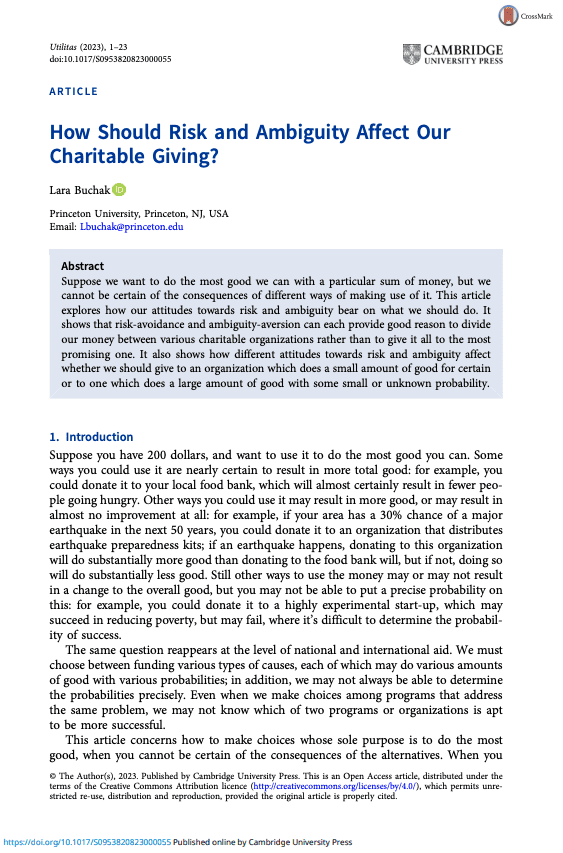How should risk and ambiguity affect our charitable giving?
Lara Buchak (Princeton University)
GPI Working Paper No. 8 - 2022, published in Utilitas
Suppose we want to do the most good we can with a particular sum of money, but we cannot be certain of the consequences of different ways of making use of it. This paper explores how our attitudes towards risk and ambiguity bear on what we should do. It shows that risk-avoidance and ambiguity-aversion can each provide good reason to divide our money between various charitable organizations rather than to give it all to the most promising one. It also shows on how different attitudes towards risk and ambiguity affect whether we should give to an organization which does a small amount of good for certain or to one which does a large amount of good with some small, unknown probability.
Other working papers
The Hinge of History Hypothesis: Reply to MacAskill – Andreas Mogensen (Global Priorities Institute, University of Oxford)
Some believe that the current era is uniquely important with respect to how well the rest of human history goes. Following Parfit, call this the Hinge of History Hypothesis. Recently, MacAskill has argued that our era is actually very unlikely to be especially influential in the way asserted by the Hinge of History Hypothesis. I respond to MacAskill, pointing to important unresolved ambiguities in his proposed definition of what it means for a time to be influential and criticizing the two arguments…
Time Bias and Altruism – Leora Urim Sung (University College London)
We are typically near-future biased, being more concerned with our near future than our distant future. This near-future bias can be directed at others too, being more concerned with their near future than their distant future. In this paper, I argue that, because we discount the future in this way, beyond a certain point in time, we morally ought to be more concerned with the present well- being of others than with the well-being of our distant future selves. It follows that we morally ought to sacrifice…
Moral demands and the far future – Andreas Mogensen (Global Priorities Institute, Oxford University)
I argue that moral philosophers have either misunderstood the problem of moral demandingness or at least failed to recognize important dimensions of the problem that undermine many standard assumptions. It has been assumed that utilitarianism concretely directs us to maximize welfare within a generation by transferring resources to people currently living in extreme poverty. In fact, utilitarianism seems to imply that any obligation to help people who are currently badly off is trumped by obligations to undertake actions targeted at improving the value…

